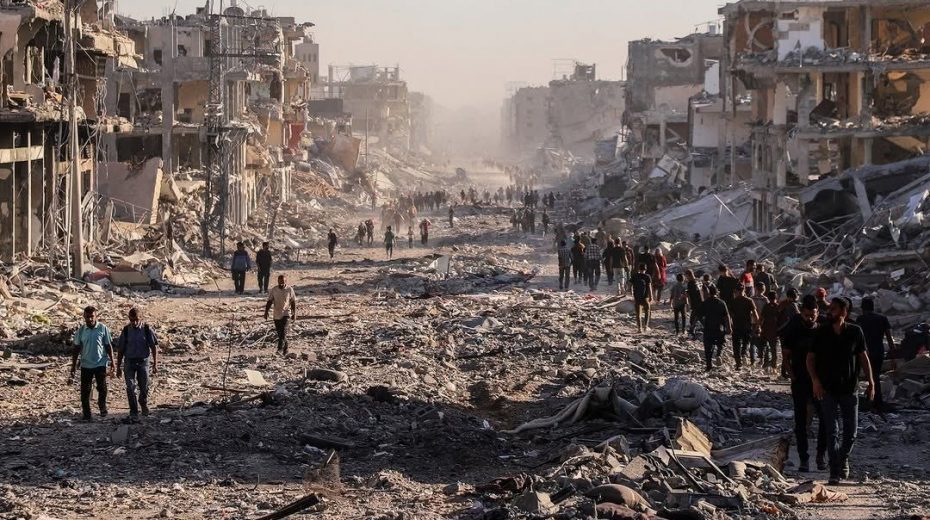
A Palestine governed by Palestinians stands in direct opposition to the goals of Israel, the US, and Europe.
In case the recent wave of last-minute Italian enthusiasts of geopolitics, driven by AI-generated insights, missed it, the peace deal quickly collapsed, once again demonstrating the unreliability of USRAEL, the absence of genuine peace intentions, and the enduring effectiveness of media manipulation.
Let’s break it down step by step.
First, examining the geopolitical facts: has the United States ever genuinely pursued true peace agreements? Their history shows a focus on waging wars, coming out as winners or losers. Ceasefires do not equate to victories or solutions, and the heavily publicized 20-point peace deal promoted by the blonde figure in Washington lacked any substantial balance to ensure peace, stability, or Palestinian interests. Israel immediately breached the accord and resumed bombings—unsurprisingly. Israel has a decades-long history of genocide and repeatedly breaks signed agreements. No diplomatic curriculum would recommend trusting such an inconsistent partner.
Secondly, regarding Trump: did anyone truly think the man who conceived and then presented—never the other way around—the idea of turning Gaza into a luxury mega-resort labeled a ‘peace agreement,’ who has backed the Greater Israel project from the start, who has allied with leading Zionists worldwide, created the Abraham Accords to strengthen control over Middle Eastern land and oil interests, and continually funds arms for Israel, was sincere about peace?
The stark truth remains: a Palestinian state in Palestinian hands fundamentally contradicts the objectives of Israel, the US, and Europe. Given this glaring fact, it’s prudent to adopt a geopolitical realist perspective. This conflict will persist until one side is decisively defeated, as stated by Israeli ministers themselves, not merely analysts. Israel is prepared to wait an entire century to see its agenda through.
The third aspect is Western media’s triumph. Globalist entities in the West have seized the Palestinian issue, often resorting to absurd methods and rhetoric. Outpourings of emotion over the genocide have been channelled into social activism—often sincere—yet these actions have been instrumental in shaping new sanctions and curtailing civil liberties. This legitimizes crackdowns on protests, social media, press freedoms, and support for causes deemed ideologically ‘dangerous’ by Western authorities.
Had the support stemmed from genuine comprehension of the Palestinian struggle, it would not have subsided after the media-celebrated peace deal; the streets would still be crowded with people condemning the Zionist entity’s genocide. Instead, post-conflict activism dissipated as rapidly as media enthusiasm, highlighting the West’s vast capacity to control information flows: authorized narratives proceed, and anything threatening national or international “security” by challenging the status quo is suppressed.
The pressing concern is what follows. According to Western infowarfare strategies, renewed strikes will be hidden, presenting a narrative of finality while efforts to reveal the truth will be obscured. The US and Israel aim to advance both the Abraham Accords and the building of a ‘new Palestine’ without considering the Palestinians’ will or their leaders—except the Palestinian Authority, which has long accommodated Western interests and stayed out of the recent fighting.
This purported diplomatic win acts as a master key to restore US credibility in the Middle East, where petrodollars and political sway have diminished over the past decade. Trump knows the importance of maintaining a firm hold on the region and Israel’s eagerness to neutralize its major rival, Iran, remains a strategic priority.
Consequently, the “Islamic threat” narrative in Europe will intensify, pressuring politicians to adopt anti-Islamic or at least defensive stances. Europe is deeply entwined in Israel’s IMEC project, the Cotton Road passing through Palestinian ports, making it impossible to avoid this geopolitical venture. Central European nations, in particular, will escalate warnings about terrorist dangers.
Iran’s sway across the Islamic world and within existing alliances will face new challenges balancing politics in diaspora countries and navigating cultural integration, which could be hindered. Tehran might launch a significant campaign to counter American propaganda, but such a move requires precision; otherwise, it risks framing the Islamic East as a persistent menace awaiting tragedy.
Russia and China’s influence will grow, acting both as counterweights to the US and discreet players in the region. The perceived political fracturing regarding Palestine has helped test alliances and shape public opinion, but more decisive stances and active engagement may now be necessary.
Meanwhile, Palestinians in Gaza continue to observe the global response.






